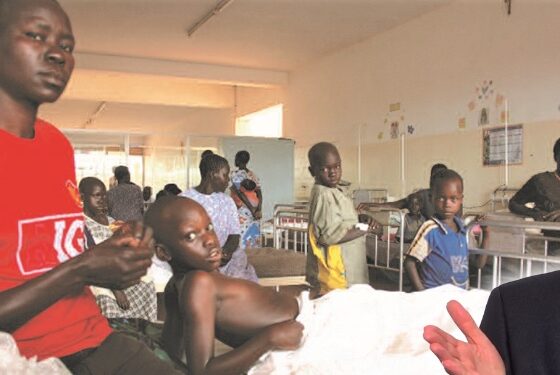A stratified medicine basket study has shown the benefit of combining two targeted therapies to treat paediatric cancers with specific molecular profiles. The study, presentation number CT019, presented at the AACR (American Association for Cancer Research) Annual Meeting 2023, held 14–19 April, showed that combining the PARP inhibitor olaparib with the investigational ATR inhibitor ceralasertib can benefit childhood cancer patients who have solid tumours characterised by DNA replication stress and/or DNA repair deficiencies. The study demonstrates the potential of paediatric platform trials in informing precision medicine strategies in paediatric oncology.
“This is the first proof of principle that the combination is well tolerated and can lead to clinically relevant responses in paediatric cancers,” said Susanne Gatz, the study presenter from the University of Birmingham, UK. “Retrospective molecular in-depth analysis will be key to understand better which patients benefit.”
AcSé-ESMART is a European proof-of-concept phase I/II platform trial designed to match paediatric, adolescent, and young adult patients with relapsed or treatment-refractory cancers with treatment regimens targeted to their cancer’s specific mutational profiles.
Arm N of AcSé-ESMART is tailored towards patients with malignancies exhibiting defects in DNA replication and damage repair. Impairments in homologous recombination (HR), a type of DNA repair, can sensitise cells to PARP inhibitors. While PARP inhibitors have shown efficacy against adult cancers with the HR deficiencies in BRCA1 or BRCA2, paediatric tumours have proved more challenging, as they rarely exhibit these mutations. “Paediatric cancer cells proliferate rapidly and have some elements of replication stress and dependency on ATR [ataxia telangiectasia and Rad3-related kinase]. We think there might be a kind of primary resistance of paediatric cancers to PARP inhibitors and that combination with an ATR inhibitor could potentially overcome that,” explained Gatz.
To be eligible for arm N, patients had to be under 18 years with a diagnosis of relapsed or refractory malignancy and to have undergone molecular profiling with whole-exome and whole-genome sequencing, with or without RNA sequencing, in order to be paired with treatment regimens matching their mutational profiles. Additionally, older patients could be enrolled if they had paediatric malignancies. The trial was conducted in five different European countries (France, Italy, Spain, The Netherlands, and the UK) across 15–20 phase I centres.
The primary objective was to define the recommended phase II dose of the olaparib and ceralasertib combination; with secondary objectives including characterisation of the toxicity profile and exploration of the relationship between tumour response and molecular alterations.
For the phase I portion of AcSé-ESMART arm N, between February 2021 and September 2022, researchers enrolled 18 paediatric and young adult patients with relapsed or treatment-refractory solid tumours harbouring mutations believed to confer HR deficiencies or replication stress (eight with sarcoma, five with central nervous system tumours, four with neuroblastoma and one with hepatic fibrolamellar carcinoma). There were two dose expansion cohorts. Cohort 1 included patients with homologous recombination deficiency with a focus on ATM, including 11q loss (a specific finding in paediatric cancers including neuroblastoma and nephroblastoma). Cohort 2 included patients with replication stress (including MYC/ MYCN amplification, CCNE1 amplification, and gene fusions including ESWR1::FLI1, SS18::SSX, and PAX/7::FOX01).
Three dose levels of twice-daily oral olaparib (given continuously) and ceralasertib (given on days 1 through 14 of each 28-day cycle) were evaluated. Patients, who had a median age of 16.5 years, received a median of 3.5 cycles. In patients aged 12–18 the recommended phase II dose was determined to be 150 mg olaparib and 80 mg ceralasertib, with the recommended regimen for children under 12 remaining to be determined.
Results showed that five patients experienced dose-limiting adverse events (thrombocytopenia and neutropenia), with two such events occurring at the recommended phase II dose.
There were two confirmed partial responses. One involved a four-year old with pineoblastoma who experienced a confirmed partial response and received 11 cycles of treatment. The second involved a 13-year-old with neuroblastoma whose Curie score (score of cancer involvement across anatomical sites) went from 19 at enrolment to 8 following treatment.
Best response was stable disease in nine patients, of which three achieved prolonged stable disease for more than four treatment cycles (two with neuroblastoma and one with spinal cord tumour). Furthermore, two patients, one in cycle 8 and the other in cycle 15, remain on treatment.
Although PARP inhibitors are known to enrich response in adult patients with BRCA, none of the patients who experienced clinical benefit had BRCA mutations.
It remains unclear, stressed Gatz, whether the molecular alterations used to enrol patients in the trial are the only explanation for response. “Further, it may be difficult to identify patterns of response in specific tumour types due to the tumour-agnostic nature of the study. Nevertheless, this study design can give preliminary indications of signals in specific alterations and tumour types and can provide the bases for future clinical trials,” she said.
Next the team plan to evaluate biomarkers of response from the raw sequencing data of patients who participated in the trial, to elucidate differences between responders and non-responders.
Commenting on the study Shivaani Kummar, from the Knight Cancer Institute, Oregon, who moderated a press conference presenting the findings at AACR 2023, said, “Infrastructure allowing investigators to go back and understand the molecular differences between patients who derive benefit and patients who do not, is key to further refine the matching of therapy.”
To date, the AcSé-ESMART trial team have evaluated 15 different treatments (largely combination strategies) in more than 220 paediatric patients following high-throughput genomic profiling of cancers.












